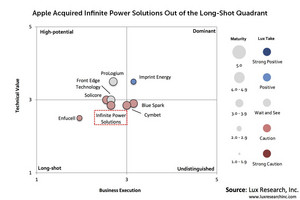BOSTON, MA--(Marketwired - Sep 29, 2015) - Leading companies like Apple, Merck KGaA, BASF, and Xerox have made high-profile acquisitions of start-ups in printed electronics. However, many of the companies acquired have been second-tier players, leaving more attractive acquisition or partnership targets open, according to Lux Research.
Of the recent high-profile deals, only Xerox's tie-up with smart packaging developer, Thin Film Electronics, represents a clear winning transaction, according to an evaluation of start-ups on the Lux Innovation Grid. In contrast, Qlight, Seashell, and Infinite Power Solutions -- the acquisitions respectively of Merck, BASF, and Apple -- were not leaders in their segments.
"While Apple, BASF, and Merck have different goals for their acquisitions, none of these companies had best-in-class technology. Xerox alone partnered with the top developer, Thin Film Electronics," said Jonathan Melnick, Lux Research Senior Analyst and lead author of the report titled, "Evaluating the Recent Printed Electronics Acquisitions and Partnerships Involving Merck, BASF, Apple, and Xerox."
"More promising technologies are still available from other partnership or acquisition targets, leaving room for other competitors to move in," he added.
Lux Research evaluated technologies and opportunities in printed electronics, weighing them against four recent acquisitions and partnerships. Among their findings:
- Apple acquisition is only a long shot. Infinite Power Solutions, a thin-film battery start-up believed to have been acquired by Apple, ranks only a "long shot" on the Lux Innovation Grid, as does Cymbet, which also has licensed the same Oak Ridge technology. Imprint Energy is the sole "dominant" company in this segment.
- Merck acquisition Qlight lags Nanosys, Nanoco. Merck's acquisition, Qlight, falls in the "High-potential" quadrant on the Lux Innovation Grid, but the strongest companies in quantum dots are Nanosys and Nanoco. Both have strong partnerships as well -- Nanoco with Dow Electronic Materials and Nanosys with 3M.
- Sinovia outpaces BASF acquisition Seashell. Sinovia's technology to replace indium tin oxide (ITO) used in displays, touchscreens, and solar panels offers better film performance -- in parameters such as sheet resistance, transparency and roughness -- than Seashell, the company acquired by BASF.
The report, titled "Evaluating the Recent Printed Electronics Acquisitions and Partnerships Involving Merck, BASF, Apple, and Xerox," is part of the Lux Research Wearable and Flexible Electronics Intelligence service.
About Lux Research
Lux Research provides strategic advice and ongoing intelligence for emerging technologies. Leaders in business, finance and government rely on us to help them make informed strategic decisions. Through our unique research approach focused on primary research and our extensive global network, we deliver insight, connections and competitive advantage to our clients. Visit www.luxresearchinc.com for more information.
Contact Information:
Contact:
Carole Jacques
Lux Research, Inc.
617-502-5314
carole.jacques@luxresearchinc.com
